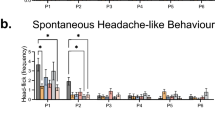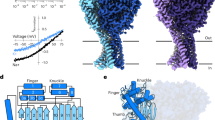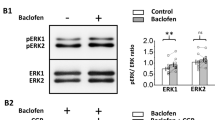Abstract
Enkephalin and opiate analgesic drugs exert their effects on the brain by interacting with receptors located on neuronal membranes. An almost immediate consequence of this interaction is an inhibition of action potential discharge of individual nerve cells1. This could result from a direct hyperpolarization of the neurone which bears the opiate receptors, thereby shifting its membrane away from the threshold for action potential generation. On the other hand, it is well known that opiates and enkephalin depress the release of neurotransmitters2,3, and this could indirectly result in an inhibition of cell firing. Here we describe experiments which indicate that Met5-enkephalin and a stable analogue, D-Ala2-D-Leu5-enkephalin (DADLE), as well as narcotic analgesics, increase the potassium conductance of neurones in the rat locus coeruleus and thereby inhibit then-spontaneous firing. This effect of the opioids results from an interaction with a receptor having a high affinity for naloxone.
This is a preview of subscription content, access via your institution
Access options
Subscribe to this journal
Receive 51 print issues and online access
$199.00 per year
only $3.90 per issue
Buy this article
- Purchase on Springer Link
- Instant access to full article PDF
Prices may be subject to local taxes which are calculated during checkout
Similar content being viewed by others
References
North, R. A. Life Sci. 15, 1527–1546 (1979).
Yaksh, T. L., Jessell, T. M., Gamse, R., Mudge, A. W. & Leeman, S. E. Nature 286, 155–157 (1980).
Kosterlitz, H. W. & Waterfield, A. A. Rev. Pharmac. 15, 29–47 (1975).
Pickel, V. M., Joh, T. H., Reis, D. J., Leeman, S. E. & Miller, R. J. Brain Res. 160, 387–400 (1979).
Korf, J., Bunney, B. S. & Aghajanian, G. K. Eur. J. Pharmac. 25, 165–169 (1974).
Scott-Young, W. S., Bird, S. J. & Kuhar, M. J. Brain Res. 129, 366–370 (1977).
Aghajanian, G. K. Nature 276, 186–188 (1978).
Pepper, C. M. & Henderson, G. Science 209, 394–396 (1980).
Henderson, G., Pepper, C. M. & Shefner, S. A. Expl Brain Res. 45, 29–37 (1982).
Hartzell, H. C., Kuffler, S. W., Stickgold, R. & Yoshikami, F. J. Physiol., Lond. 271, 817–846 (1977).
Morita, K., North, R. A. & Tokimasa, T. J. Physiol., Lond. (in the press).
North, R. A., Katayama, Y. & Williams, J. T. Brain Res. 165, 67–77 (1979).
Mudge, A. W., Leeman, S. E. & Fischbach, G. D. Proc. natn. Acad. Sci. U.S.A. 76, 526–530 (1979).
Morita, K. & North, R. A. Neuroscience 6, 1943–1951 (1981).
Carlen, O. J. & Durand, D. Neuroscience 6, 839–846 (1981).
Arunlakshana, O. & Schild, H. O. Br. J. Pharmac. Chemother. 14, 48–58 (1959).
Author information
Authors and Affiliations
Rights and permissions
About this article
Cite this article
Williams, J., Egan, T. & North, R. Enkephalin opens potassium channels on mammalian central neurones. Nature 299, 74–77 (1982). https://doi.org/10.1038/299074a0
Received:
Accepted:
Published:
Issue Date:
DOI: https://doi.org/10.1038/299074a0
This article is cited by
-
Ethanol abolishes vigilance-dependent astroglia network activation in mice by inhibiting norepinephrine release
Nature Communications (2020)
-
Dual oscillator model of the respiratory neuronal network generating quantal slowing of respiratory rhythm
Journal of Computational Neuroscience (2011)
-
Participation of the opioid- and serotonergic systems of the ventrolateral medullary regions in the control of respiratory activity in early postnatal rats
Neurophysiology (1996)
Comments
By submitting a comment you agree to abide by our Terms and Community Guidelines. If you find something abusive or that does not comply with our terms or guidelines please flag it as inappropriate.



